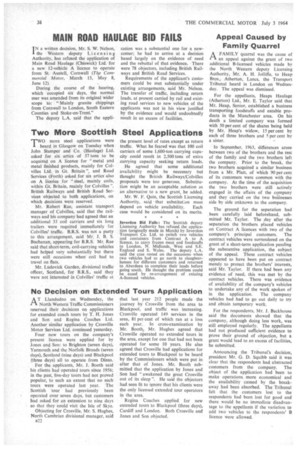Appeal Caused by Family Quarrel
Page 40

If you've noticed an error in this article please click here to report it so we can fix it.
A FAMILY quarrel was the cause of
an appeal against the grant of two additional B-licensed vehicles made by the North , Western deputy Licensing Authority, Mr. A. H. Jolliffe, to Heap Bros., Atherton, Lanes, the Transport Tribunal heard in London on Wednesday. The appeal was dismissed.
For the appellants, Heaps Haulage (Atherton) Ltd., Mr. E. Taylor said that Mr. Heap, Senior, established a business transporting foodstuffs and eatable products in the Manchester area. On his death a limited company was formed with 50 per cent of the shares being held by Mr. Heap's widow, 15 per cent by each of three brothers and 5 per cent by a sister.
In September, 1963, differences arose between two of the brothers and the rest of the family and the two brothers left the company. Prior to the break, the two brothers acquired a similar business from a Mr. Platt, of which 90 per cent of its customers were common with the company. At the time of the acquisition the two brothers were still actively engaged in the affairs of the company and they carried on the two businesses side by side unknown to the company.
The ground for the separation had been carefully laid beforehand, submitted Mr. Taylor. The day after the separation the brothers placed vehicles on Contract A licences with two of the company's principal customers. The contract vehicles were surrendered on the grant of a short-term application pending the substantive application, the subject of the appeal. These contract vehicles appeared to have been put on contract merely to protect the brothers' interests, said Mr. Taylor. If there had been any evidence of need, this was met by the contract vehicles. There was evidence of availability of the company's vehicles to undertake any of the work spoken of in the application. The company vehicles had had to go out daily to try and obtain temporary work.
For the respondents, Mr. J. Backhouse said the documents showed that the company, although doing less work, was still employed regularly. The appellants had not produced sufficient evidence to prove their ground of objection, but a grant would lead to an excess of facilities, he submitted.
Announcing the Tribunal's decision, president Mr. G. D. Squibb said it was clear that the respondents had abstracted customers from the company. The object of the application had been to make operations more economical and the availability caused by the breakaway had been absorbed. The Tribunal felt that the customers lost to the respondents had been lost for good and there would be no immediate disadvantage to the appellants if the variation to add two vehicles to the respondents' B licence were allowed.












































































































































